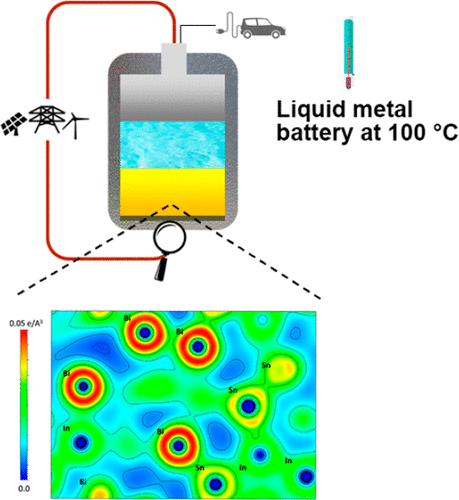当前位置:
X-MOL 学术
›
ACS Cent. Sci.
›
论文详情
Our official English website, www.x-mol.net, welcomes your feedback! (Note: you will need to create a separate account there.)
Low-Temperature Multielement Fusible Alloy-Based Molten Sodium Batteries for Grid-Scale Energy Storage
ACS Central Science ( IF 18.2 ) Pub Date : 2020-10-21 , DOI: 10.1021/acscentsci.0c01035 Yu Ding 1 , Xuelin Guo 1 , Yumin Qian 1 , Guihua Yu 1
ACS Central Science ( IF 18.2 ) Pub Date : 2020-10-21 , DOI: 10.1021/acscentsci.0c01035 Yu Ding 1 , Xuelin Guo 1 , Yumin Qian 1 , Guihua Yu 1
Affiliation

|
The sustainable future of modern society relies on the development of advanced energy systems. Alkali metals, such as Li, Na, and K, are promising to construct high-energy-density batteries to complement the fast-growing implementation of renewable sources. The stripping/deposition of alkali metals is compromised by serious dendrite growth, which can be intrinsically eliminated by using molten alkali metal anodes. Up to now, most of the conventional molten alkali metal-based batteries need to be operated at high temperatures. To decrease the operating temperature, we extended the battery chemistry to multielement alloys, which provide more flexibility for wide selection and rational screening of cost-effective and fusible metallic electrodes. On the basis of an integrated experimental and theoretical study, the depressed melting point and enhanced interfacial compatibility are elucidated. The proof-of-concept molten sodium battery enabled by the Bi–Pb–Sn fusible alloy not only circumvents the use of costly Ga and In elements but also delivers attractive performance at 100 °C, holding great promise for grid-scale energy storage.
中文翻译:

低温多元素可熔合金熔融钠电池,用于电网规模的储能
现代社会的可持续未来取决于先进能源系统的发展。诸如Li,Na和K等碱金属有望制造出高能量密度的电池,以补充快速增长的可再生能源的应用。严重的枝晶生长会损害碱金属的剥离/沉积,而枝晶的生长可以通过使用熔融的碱金属阳极本质上消除。迄今为止,大多数常规的基于熔融碱金属的电池需要在高温下操作。为了降低工作温度,我们将电池化学成分扩展到多元素合金,这为更大范围的选择和合理筛选经济有效且易熔的金属电极提供了更大的灵活性。在综合实验和理论研究的基础上,阐明了降低的熔点和增强的界面相容性。Bi-Pb-Sn易熔合金支持概念验证的熔融钠电池,不仅避免了使用昂贵的Ga和In元素,而且在100°C的温度下仍具有诱人的性能,为电网规模的储能提供了广阔的前景。
更新日期:2020-12-23
中文翻译:

低温多元素可熔合金熔融钠电池,用于电网规模的储能
现代社会的可持续未来取决于先进能源系统的发展。诸如Li,Na和K等碱金属有望制造出高能量密度的电池,以补充快速增长的可再生能源的应用。严重的枝晶生长会损害碱金属的剥离/沉积,而枝晶的生长可以通过使用熔融的碱金属阳极本质上消除。迄今为止,大多数常规的基于熔融碱金属的电池需要在高温下操作。为了降低工作温度,我们将电池化学成分扩展到多元素合金,这为更大范围的选择和合理筛选经济有效且易熔的金属电极提供了更大的灵活性。在综合实验和理论研究的基础上,阐明了降低的熔点和增强的界面相容性。Bi-Pb-Sn易熔合金支持概念验证的熔融钠电池,不仅避免了使用昂贵的Ga和In元素,而且在100°C的温度下仍具有诱人的性能,为电网规模的储能提供了广阔的前景。

























 京公网安备 11010802027423号
京公网安备 11010802027423号